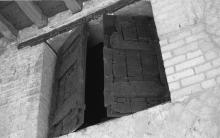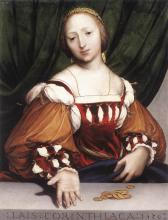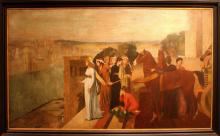Aestus erat, mediamque diēs exēgerat hōram;
apposuī mediō membra levanda torō.
pars adaperta fuit, pars altera clausa fenestrae,
quāle ferē silvae lūmen habēre solent,
quālia sublūcent fugiente crepuscula Phoebō5
aut ubi nox abiit nec tamen orta diēs.
illa verēcundīs lūx est praebenda puellīs,
quā timidus latebrās spēret habēre pudor.
ecce, Corinna venit tunicā vēlāta recīnctā,
candida dīviduā colla tegente comā,10
quāliter in thalamōs fōrmōsa Semīramis īsse
dīcitur et multīs Lāis amāta virīs.
dēripuī tunicam; nec multum rāra nocēbat,
pugnābat tunicā sed tamen illa tegī;
cumque ita pugnāret tamquam quae vincere nōllet,15
victa est nōn aegrē prōditiōne suā.
ut stetit ante oculōs positō vēlāmine nostrōs,
in tōtō nusquam corpore menda fuit:
quōs umerōs, quālēs vīdī tetigīque lacertōs!
fōrma papillārum quam fuit apta premī!20
quam castīgātō plānus sub pectore venter!
quantum et quāle latus! quam iuvenāle femur!
singula quid referam? nīl nōn laudābile vīdī,
et nūdam pressī corpus ad usque meum.
cētera quis nescit? lassī requiēvimus ambō.25
prōveniant mediī sīc mihi saepe diēs.
notes
1.5: The Siesta
It is midday, the poet is having his siesta, and the room is dark and tranquil (Roman shutters were very effective). The light is beautiful for its own sake, even magical, but it is also particularly suitable for girls who are “modest.” [full essay]
1–2: aestus > aestus, -ūs, m. "tide; heat"; here "a hot spell, hot season." This could simply be describing the weather, or it could have sexual connotations. exēgerat > exigō, -ere, -ēgī, -actum, "to drive out"; here (of a period of time) "to bring to an end." torō: dative of direction with a verb of motion (AG §428h). levanda > levō -āre, "to lighten, relieve"; membra levāre means "to rest"; a gerundive used as a simple participle to express purpose, "I had laid my limbs to rest."
3–4: adaperta: "open." quāle ... lūmen: "like the light which"; this is in apposition to all of line 3. Wooden shutters from Herculaneum, carbonized in the eruption of Vesuvius in AD 79, give some idea of their methods of construction. When needed these could be further covered with curtains to shut out all light (Juvenal, Satires 9.105 vela tegant rimas).
5–6: quālia ... crepuscula: "like the twilight which"; also in apposition to line 3. fugiente ... Phoebō: "as Apollo is fleeing," i.e., "as the sun is setting," ablative absolute. Apollo was the god of the sun, which his steeds and chariot pulled across the sky from east to west. nec ... orta: understand est, "has not risen."
7–8: quā ... spēret: relative clause of characteristic (AG §535); quā (its antecedent is lūx) is an ablative of means (AG §409); "the kind of light in which."
9–10: Corinna: here the poet’s lover is finally introduced by name. Corinna was the name of a real-life Greek poet, just as the name Lesbia, which Catullus gave his lover, was an allusion to the poet Sappho. "Corinna" may be based on the Greek word κόρη ("maiden"), the Greek equivalent of puella. vēlāta > vēlō -āre, "to cover, clothe"; the juxtaposition of vēlāta and tunicā recinctā produces an ironic oxymoron: "clothed in an unfastened tunic." dīviduā: < dīviduus, a, um "divided"; we thus infer that Corinna had long hair, and that her hairdo was undone, with her hair hanging over each shoulder. colla: plural for singular (as in 1.4.35).
11–12: quāliter: "in which way, so" (adverb). Semīramis > Semīramis, -idis, f. the legendary queen of Assyria; she was famous for her regal nature, her beauty, and lust. Lāis > Lāis, -idis or -idos, f. the name of two famous Greek courtesans. virīs: dative of agent, as often with perfect participles (AG §375). Degas' great canvass "Semiramis Constructing Babylon" (1861) goes somewhat against orientalist stereotypes depicting the queen as lascivious and over-sexed (a reputation hinted at here by Ovid), and shows her as statuessuqe and austere, a lovely but commanding figure. Hans Holbein's picture of Lais from 1526 combines a relatively racy dress for the period with beatific and innocent facial features reminscent of the Madonnas of Rafael and Leonardo.
13–14: multum: "much" (adverbial), modifying nocēbat. rāra: modifies an understood tunica; here "thin" or possibly "scanty." nocēbat > noceō, nocēre, nocuī, nocitum "harm" but here "detract," i.e., the tunic didn’t present much of an obstacle. pugnābat tunicā sed tamen illa tegī = sed tamen illa pugnābat tunicā tegī; the postponed conjunction (sed) highlights the words placed in front of it (pugnābat, tunicā).
15–16: cumque ita pugnāret tamquam quae vincere nōllet = cum ita pugnāret tamquam aliquis pugnāret quae vincere nōllet. The cum clause is causal (AG §549). For relative clauses of characteristic, see AG §535.
17–18: nostrōs: = meōs. menda: "fault, blemish." Ovid is the only poet to use this word to mean a physical blemish; in other authors it refers to literary faults.
19–22: quōs ... quāles ... quam ... quantum: Anaphora. Ovid here describes his lady’s charms, starting at the top and working his way down.
19–20: quōs umerōs: exclamatory quis, "what!" quam: exclamatory quam, "how!", modifying an adjective. apta: "suitable, proper," here construed with a passive infinitive.
21–22: castīgātō > castīgātus -a -um "tightly drawn, controlled." Notice that this line is entirely spondaic except for the fifth foot, presumably suggestive of the poet’s careful admiration. quantum et quāle latus > latus, lateris n., "side"; accusative of exclamation (AG §397d). In referring to the human body latus most often refers to the upper trunk (OLD 1a), but since the poet seems to be working his way down Corinna’s body it perhaps here means "hip"; this would help explain why he so much admired its size, since the Romans seem to have preferred big hips on women.
23–24: quid: = cūr. referam: deliberative subjunctive (AG §444a). nudam pressī: "I clasped her, naked as she was" (Barsby). corpus ad usque meum = usque ad meum corpus; hyperbaton (a violent disruption of the natural word order for dramatic effect).
25–26: proveniant: optative subjunctive, "I hope that middays may turn out."
vocabulary
aestus -ūs m.: tide; heat
appōnō -pōnere -posuī -positum: put down, set down
levō -āre: lighten, relieve
torus -ī m.: bed, couch [image]
adaperiō -aperīre -aperuī -apertum: open fully
fenestra -ae f.: window [image]
sublūceō -lūcēre: shine faintly, glimmer, gleam
crepusculum -ī n.: evening, twilight
5
Phoebus -ī m.: Apollo
verēcundus -a -um: bashful, modest, shy
timidus -a -um: fearful, timid, shy
latebra -ae f.: hiding place, concealment
Corinna -ae f.: Corinna
vēlō -āre: cover, clothe
recingō -cingere -cinxī -cīnctum: ungird, loosen
dīviduus -a -um: divided
collum -ī n. : neck10
thalamus -ī m.: marriage bed; bedchamber
formōsus -a -um: shapely, beautiful
Samīramis -idis f.: Samiramis, a legendary queen of Assyria
Lāis -idis or -idos f.: Lais, the name of two famous Greek courtesans
dēripiō -ripere -ripuī -reptum: snatch away, tear down
tunica -ae f.: tunic
prōditiō -ōnis f.: betrayal, abandonment (of a cause)16
vēlāmen -inis n.: covering, garment
nūsquam: (adv.) nowhere
menda -ae f.: fault, defect, blemish
umerus -ī m.: shoulder
lacertus -ī m.: the arm, esp. the upper arm
papilla -ae f.: nipple, breast
castīgātus -a -um: checked, restrained
plānus -a -um: flat, level
venter -ris m.: stomach, belly20
iuvenālis -e: youthful
femur -oris n.: thigh
laudābilis -e: praiseworthy, laudable
lassus -a -um: tired, weary
requiescō -quiescere -quiēvī -quiētum: rest, repose
ambō -ae -ō: both25
prōveniō -venīre -vēnī -ventūrum: come forth; come about



